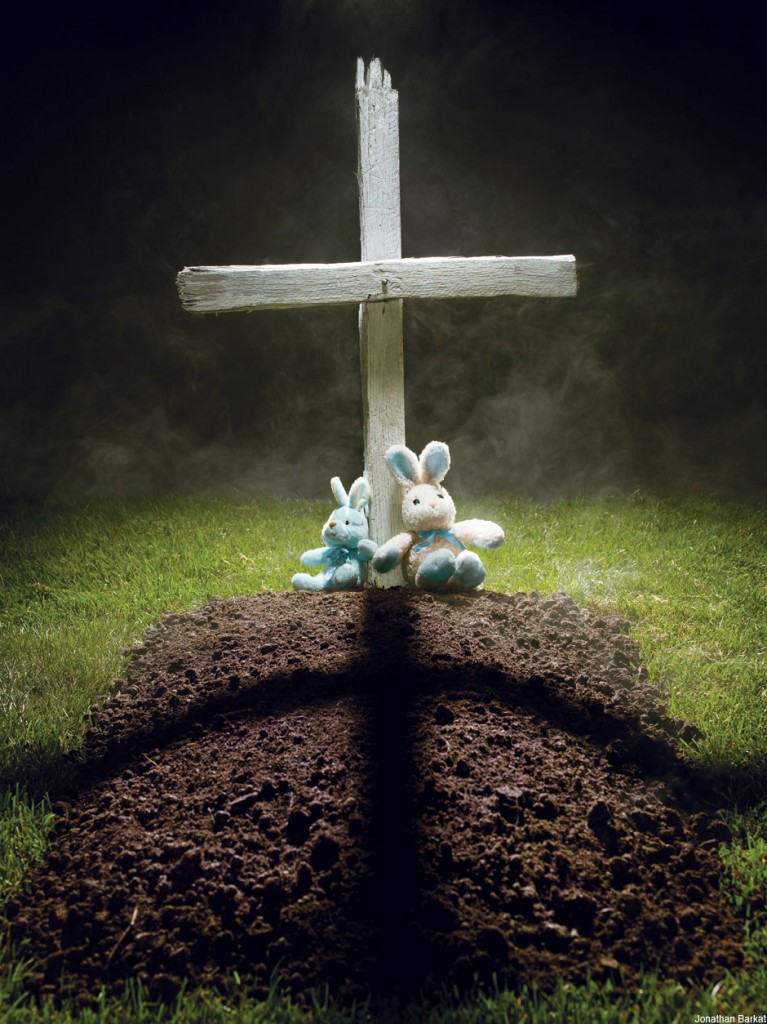Why Did the Schaibles Let Their Children Die?
On the night of April 18th, Detective Brian Peters of the Philadelphia homicide unit saw something strange—something he’d never witnessed before—when he interviewed Herbert Schaible. Herbert’s seven-month-old son, Brandon, had died earlier that evening. Herbert and his wife, Cathy, were brought downtown for questioning from their home in the Northeast.
That was because the Schaibles were already on probation for involuntary manslaughter, following the death of another son, two-year-old Kent, in 2009.
Both boys had died of bacterial pneumonia, which most of the world treats successfully through vaccination or, in the event of an infection, antibiotics. But Herbie and Cathy Schaible are members of First Century Gospel, a nondenominational Baptist church on
G Street in Feltonville that believes strictly in divine healing—meaning no vaccinations, no medicine, no doctors. Prayer, its members believe, and believe fervently, is the path to conquering illness or injury. The members reject many other mainstays of modern life. They don’t believe in home ownership. (Everyone rents.) Or birth control. Or seatbelts. Or eyeglasses. Or college degrees.
None of that was what was strange to Detective Peters, however.
Peters likes to get to know people a bit, make human contact, before the formal interview. And Herbie Schaible, 44, a tall man dressed in a flannel shirt and jeans, with short-cropped hair, was perfectly willing to explain, calmly: Healing occurs through God’s will. Only God’s will could have saved his son. He said this several times, and would repeat it in his statement when he was asked if he regretted not taking Brandon to a doctor. “No, I don’t regret it,” Herbie said, “because we believe that the only way is the right way and that is through God. I would change places with either of my sons. But it’s God’s will. He is the healer of our bodies.”
Cathy Schaible told detective Jimmy Crone the same thing. A small, quiet, deferential woman who wholeheartedly abides by church teaching that her husband is in charge of family decisions, Cathy said, simply, “We pray and ask God to heal … the way Jesus did when He was on Earth.”
But even more surprising than the belief that only answered prayers could heal their son was the demeanor of both Herbie and Cathy. They were low-key. Calm. Very calm. Matter-of-fact, one might say. Peters and Crone have seen a lot of things in their years of talking to suspects and family members of murder victims, but never that.
There was something else Detective Peters had never witnessed: children so well-behaved. Six of the Schaibles’ seven living children—three-year-old Nolan was with his grandmother—had come to police headquarters with their parents. As Herbie and Cathy were questioned, their children sat together on a bench, quietly, and waited for two hours. Seventeen-year-old Herbert, the eldest, was in charge. Peters and Crone had never seen such polite, nice children, obviously well cared-for, brought into a police station.
Nor parents so calm in the face of the sudden death of a child. Their second child to die in four years.
There is an explanation for the attitude that befuddled the detectives. The Schaibles’ relationship with God is, far and away, the most important thing in their lives; everything springs from it. So their faith trumps even their love for their children. The night Brandon died, the outside world—through the legal system, in the questions of the detectives—was asking for an explanation, which placed Herbie and Cathy directly in the place they feel most comfortable: within the dictates of their faith. Why hadn’t they taken Brandon to a doctor even when it was apparent he was quite sick? To our ears, it sounds absurd. In their minds, it’s fundamental: Brandon could only be saved by God’s will.
Not that it has been easy. Later, alone and with family, they would break down and cry, grieving for their second dead son.
And now Herbert and Catherine Schaible face third-degree murder charges, for not getting medical help for Brandon, for letting the pneumonia he developed kill him. Their trial is months away. Herbie is in prison—the judge is worried about him fleeing. Cathy is under house arrest at her parents’ home on Roosevelt Boulevard. Some of the remaining children are being cared for by Herbie’s youngest brother, others by a cousin.
Their family has been torn apart, but the Schaibles remain steadfast in their faith—a faith that if anything, says their pastor, is now stronger. They have prayed for greater understanding. To understand what it is they were doing wrong, what it is that would lead God not to answer their prayers to save Kent, and then Brandon.
The Schaibles’ story, and that of First Century Gospel, is large. Two children are dead. They may be dead because their parents practice a brand of Christianity that seems straight out of the Dark Ages. The D.A., however justified in charging them with murder, is rubbing up against the American founding principle of religious freedom. It is a case that may, in fact, threaten the very existence of their church.
And it’s large because of its strangeness. We want to know how you get here, where Herbie and Cathy Schaible have landed. Not the legal trouble they’re now in—that path is clear enough—but rather, their brand of faith. These two things—being accused of murder and their faith—are firmly intertwined.
It is difficult not to pass judgment, to resist dismissing the Schaibles’ beliefs as flat-out stupid or crazy. But such judgment makes the Schaibles, and their church, impossible to understand.



